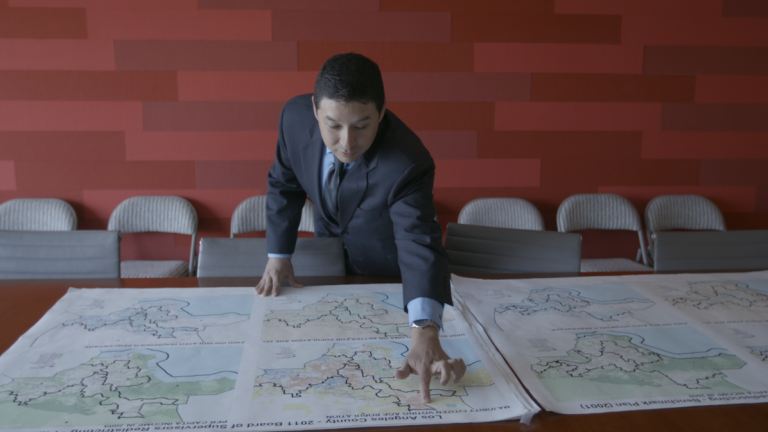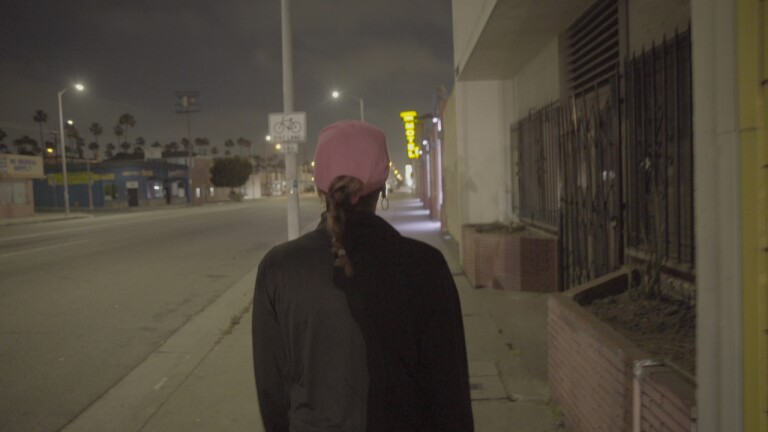
With DREAM Acts, Undocumented Students Coming Out of the Shadows

FAQ: Deferred Action for Childhood Arrivals
There's been a lot of talk about immigration reform this week. President Obama made it a priority in his State of the Union. Here in California, lawmakers have already taken steps to assist young people without documents who want to go to college. But as Laurel Erickson reports, the efforts are not without controversy.
TRANSCRIPT:
Maylei Blackwell/UCLA Professor: When I was a waitress, I worked with a busboy who was a medical doctor in Mexico, and he wasn't able to practice because of his language skills.
Erickson/Correspondent: This former waitress is now a Ph.D, lecturing in UCLA's historic Moore Hall. Welcome to Professor Maylei Blackwell's "Introduction to Chicano Studies" class.
Blackwell: Today, we're going to look at different discourse that frame the immigration debate.
Protesters [in video footage]: Education, not deportation! Education, not deportation!
Erickson: For nearly ten years, UCLA has been the site of well-organized sit-ins and rallies, marches and vigils, ground zero of "DREAM Act" activism, the act which would give undocumented college students, nicknamed "dreamers," the same access to state grants and scholarships as legal residents.
Protesters [in video footage]: Politics later! Education now!
Erickson: The protests paid off. California is one of 12 states with "DREAM acts" now in place, leveling the financial playing field for students in the country illegally. Starting in January of 2012, undocumented students here in California were allowed to apply for privately funded UC scholarships. One year later, as of January of 2013, state-funded scholarships and grants became available. But without a national "DREAM Act," there's no access to any federal funds for undocumented students.
Protester [in video footage]: We want to be doctors. We want to be lawyers. We want to be scientists. Everything. Everyone who has a dream.
Erickson: The largest group of undocumented students in the state probably attend UCLA. The university keeps the exact numbers confidential, but student activists guess that it's 600 or more. Unless someone self-identifies as being in the country illegally, Professor Blackwell has no idea who's who in her classes, but she says what matters is that the neediest students get an education.
Blackwell: I have students, who can't afford books, who don't have stable housing, who work as domestic workers or who work in hotels. So, I think the DREAM Act is really vital to equality in education in California and to the changing demographics that we face.
Karina Perez/Undocumented Student: My family is currently putting two students through college. I am here, and my younger brother is at community college, so they are helping both of us get through college. It's just a huge financial burden when you have to pay five grand every three months.
Protesters [in video footage]: DREAM Act now! DREAM Act now!
Erickson: There was a time when speaking up and speaking out would be unthinkable for an undocumented student. But the times, they are a-changing! A new website launched by Steve Jobs' widow, Laurene Powell Jobs, allows "dreamers" to not only come out of the shadows, but to be in the spotlight to push for passage of a federal DREAM Act. The site is called "The Dream is Now."
Osmar [from website]: Today, I am going to take a really big step in my life. I am going to step out the shadow and into the public sphere.
Candy [from website]: I have a secret that I am very hesitant to share.
Erickson: Over a hundred young people have posted their own videos online. Academy Award winning filmmaker Davis Guggenheim is working with Jobs, shooting stories about "dreamers" for an upcoming documentary.
Undocumented Student [from video footage]: All of my siblings are documented, except me.
Diego Sepulveda/Undocumented UCLA Grad: August 12 is my birthday. Yeah, so I crossed the border on my birthday, so every single time I celebrate my birthday, I also celebrate being in this country. And I've been here for 21 years.
Erickson: Diego Sepulveda's family crossed the border illegally when he was 4 years old. Blanca Alcantara's parents came here from Mexico City on a now-expired tourist visa when Blanca was 11. At her first DREAM Act event on-campus, she was shocked by students chanting, "We're undocumented and unafraid."
Alcantara: And I was just thinking to myself, "What if someone, an anti-immigrant walks by and hears these people yelling?" I was like, "Oh! I don't want to get beat up." But then I said that I need to be self-empowered and fight for the same things that they are fighting for.
Sepulveda: When I got this paper, I honestly broke down and I was like, "Do I really have this piece of paper in my hands?"
Erickson: Diego and his older brother were the first ones in the family to finish high school. While his brother had to quit community college due to money problems, Diego toughed it out at UCLA.
Sepulveda: I didn't have money, so I started staying in the library, staying in my friend's dorms. I didn't have money for food, and I didn't have clean clothing a lot of times. So, would just kind of wear the same thing. And it was hard, but I remember being in my classes hungry and tired, just exhausted from being undocumented.
Erickson: After graduating last year, Diego started working on a master's degree. But first, he took advantage of DACA, Deferred Action for Childhood Arrivals. That's the process President Obama put in place last year to suspend deportation of certain people brought here illegally as children. Not everyone is eligible. To qualify, the main point you have to prove is that you were under age 31 as of June 15, 2012; that you came to the U.S. before your 16th birthday; that you're currently in school; have graduated from high school or have a GED. You also must have lived continuously in the U.S. since June of 2007, no gaps in residency; and you haven't been convicted of a felony or a significant misdemeanor. The filing fee is pricey: $465. Both Diego and Blanca have filed, saying they're grateful to pay for being on a path toward legal residency.
Sepulveda: Behind closed doors, there are those tears. There are those moments when we just feel like breaking down and you can't go through it anymore. And once you live the experience of being undocumented, you know how much those tears are worth. You know the struggle, and you know how much you put to be able to get to where you are today.
Erickson: Since "Deferred Action" started six months ago, the number of applicants is closing in on half-a-million young people like Diego and Blanca. Filers overwhelmingly live in California. All of the applicants in the next two states, Texas and New York, combined don't equal the numbers here. For the years 2013 to 2014, the DREAM Act is expected to cost the state $33 million with that figure doubling, maybe even tripling in subsequent years. Some critics believe that's too high a price.
Luis Alvarado/Political Consultant: The reason I happen to be a Republican is because I believe in the fiscal responsibility of the government.
Erickson: Luis Alvarado is a political consultant who says Sacramento was too eager to step in when Washington D.C. should be stepping up to pay education costs for undocumented students.
Alvarado: Yes, they deserved to be helped in this process. Yes, they deserve to stay in the state. And yes, we would love to see them succeed. It just shouldn't have to come from Sacramento. That's the responsibility and failure of Washington, D.C.
Erickson: Who's losing? Where do you think the money should be spent?
Alvarado: Education in general. We're getting cuts for school programs K through 12. We're getting money being spent on trains to nowhere with the fast train. We're getting senior citizens that used to get support from Medi-Cal.
It wasn't just the effect of getting the bill passed for the students. It was for the effect of garnishing these students and creating a political atmosphere to help defeat Republicans, to help elect Democrats.
Erickson: Are you jealous?
Alvarado: In a way, yes, because we should be doing this much better. I give that to the Democrats: it was a political maneuver for political expediency.
Erickson: Expediency or not, Professor Blackwell says the state did the right thing, moving ahead while the federal government lags behind on such a critical issue.
Blackwell: For me, it's about giving them the tools they need to be able to contribute to our society, and to allow them to fulfill their dream, but also the dream of what California could be.
Sepulveda: A lot of people told me that I was never going to be able to graduate and here I am, standing as an alumnus, and it just blows my mind.
Alcantara: There are many things that have to be fixed within the system, but no one is to be blamed. Laws made us undocumented and we just want to be a part of this community and we just want to be a part of this society and give back to the nation that has opened the doors for us.





















